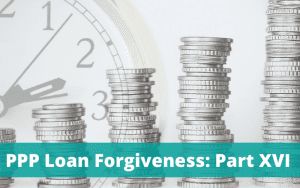Is PPP Loan Forgiveness Taxable in California?
Governor Newsom just signed Assembly Bill 80, California’s latest legislation enacted to address the issue of taxability of PPP loan forgiveness. This bill is being touted as a giant “tax relief” measure for small businesses hurt by the coronavirus pandemic. While we applaud the legislature’s attempt to provide relief for certain businesses, we believe that this bill creates more questions than answers, especially for those businesses that do not meet the eligibility criteria. Until these questions are answered, we continue to recommend delaying the filing of 2020 tax returns that are impacted by PPP Loans.
Why do we say that this creates more questions than answers? AB 80 codifies sections of the federal Consolidated Appropriation Act (CAA). The sections of the CAA referred to in AB 80 were Congress’ attempt to tell the Treasury that they really meant what they said in the CARES Act: PPP loan forgiveness is not taxable. And no backdoor attempts to make it taxable by limiting deductions or reducing tax attributes (carryforwards, basis limitations, etc.). Just stop trying to circumvent Congressional intent and clear statutory language. This was done because the IRS had issued Revenue Ruling 2020-27 that was an attempt to limit deductions in 2020 with a novel standard of “reasonable expectation” to obtain loan forgiveness. The Revenue Ruling would not only effectively make loan forgiveness taxable, but it would also accelerate it into 2020 even though forgiveness could be delayed into 2021 or may never be obtained at all. With the CAA, Treasury was put in its place, and subsequently revoked Revenue Ruling 2020-27.
California, in the meantime, passed AB 1577, which codified the Treasury’s attempt to limit deductions as a way of making forgiveness taxable, and in guidance from the FTB and legislative analysis, relied heavily on IRS Revenue Ruling 2020-27 to justify taxation of PPP Loan proceeds in 2020. AB 1577 was the law in California until AB 80 was passed. We believe that for those businesses that don’t meet the qualifications set forth in AB 80, it is still the law. AB 1577 specifies that any deduction upon which loan forgiveness is based shall not be allowed. It does not address, however, when loan forgiveness is obtained in 2021 but loan proceeds are used in 2020. It also doesn’t address the novel concept of “reasonable expectation” found only in a revoked Revenue Ruling. We believe that “timing is everything” in this case, and that AB 80 does nothing to clarify this issue.
Which businesses are eligible for this “tax cut”? If you meet the test to qualify for a PPP2 Loan, you qualify for full forgiveness under AB 80. As a reminder, this means a reduction in gross receipts of 25% or more for any calendar quarter in 2020 as compared to that same quarter in 2019. If you had a 24.9% reduction, too bad, you have full taxation of PPP Loan proceeds. This is a “cliff test” that will leave many struggling businesses with large tax payments to California at a time of record surpluses in the California budget. There are several questions that need to be answered for those businesses that seem to qualify or are trying to make the calculation to qualify. These questions include whether there is a requirement to document the 25% receipts reduction, the treatment for self-employed individuals, the effect of change in entity form, and procedures for those that already filed their returns using AB 1577. We are waiting for guidance from the FTB on all of these. Which means you must also wait.
Patience has been our mantra from the beginning, and we are not wavering from it. We believe that the pot o’ gold is still there at the end of the rainbow for those who are patient enough to get there.





